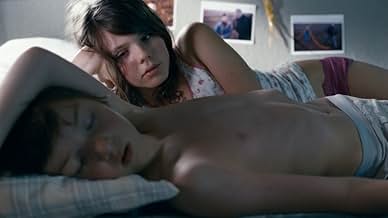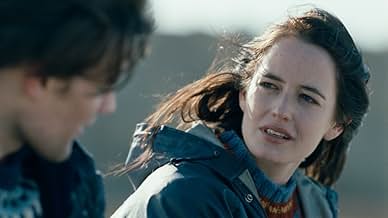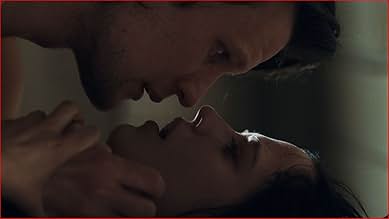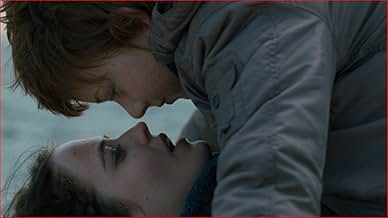A woman's consuming love forces her to bear the clone of her dead beloved. From his infancy to manhood, she faces the unavoidable complexities of her controversial decision.A woman's consuming love forces her to bear the clone of her dead beloved. From his infancy to manhood, she faces the unavoidable complexities of her controversial decision.A woman's consuming love forces her to bear the clone of her dead beloved. From his infancy to manhood, she faces the unavoidable complexities of her controversial decision.
- Awards
- 1 win & 1 nomination total
- Director
- Writer
- All cast & crew
- Production, box office & more at IMDbPro
Featured reviews
At one point in the film there's a lingering shot of a snail, as if an obvious metaphor that Womb gestates ever so slowly in its story, covering decades of its characters' lives, and does so in such a bleak and loving fashion that it provides you breathing space that sets you thinking in each scene, akin to observing the quietest kid in class who turns out to be the most explosive. If you've read the synopsis by now you'd know this film deals with the issues associated with cloning, and finds kindred spirits with films such as Jonathan Glazer's Birth and especially Mark Romanek's Never Let Me Go.
Hungarian writer-director Benedek Fliegauf tackles his first English language film with Womb, exploring an intense underlying love story that's treated and shot with Zen minimalist principles against the hauntingly beautiful backdrop of Sylt and other equally amazing landscapes in and around Hamburg. Technical strengths in presenting this film cannot be ignored, such as how patiently quiet the narrative is with little dialogue, allow emotions to overwhelm on screen, with sound intricately designed around emotions of frustration, anger and fear. Simply put, this is one journey spanning lifetimes that you'd have to open your heart out to, checking that nagging thought process about the plausibleness of the story at the door, otherwise you'll find yourself deeply muddled given that this in essence is like a science fiction fantasy.
It's a story about attraction, and how inexplicable it can sometimes be, as if of a chemical nature that draws one's attention to another, and how we are thought to be wired up to be attracted to a certain type, profile, or genetic make up, with the latter of course playing a big role in this film since it involves the cloning of a human being, and the existential exploration of whether a clone can ever be the same as its original, or the degree it is so similar. It raises interesting arguments about that of nature versus nurture, since one's personality and values are catalyzed by the growing up process, and while one can be grown from a petri dish, events that shape one's character are external and cannot be controlled, somehow.
But Womb pushes that boundary a little bit further. What if it involves a surrogate mother, won't her 9 months pregnancy in carrying the foetus play a part, and like the film had shown, care had been taken to grow the subject in a fairly controlled environment. Rebecca (Eva Green) and Tommy (Matt Smith) are on the cusp of a budding romantic relationship, where their years apart since young didn't even seem to damper their strong emotions toward each other, only for a sudden road accident to cruelly snatch one away from the other. In what would be a controversial move, Rebecca enrolls to have herself impregnated and becoming the surrogate mother of Tommy's clone, for the selfish belief that in doing so will allow Tommy to live again, much to the disappointment and shock of Tommy's mother, who chose to depart rather than to see a mirror of her lost child in another human being, now brought up by another woman.
It's the ultimate possessive love story, where one can now boast of having being there right from the start of a lover's life, nurturing him from a toddler to a young adult, to the point where one last left off. In most love stories, the feel good factor post tragedy is to discover one expecting the child of a lover now deceased, but in Womb and to a degree of morbidity, it's now the expecting of the lover himself that raises plenty of alarm bells, especially when sexual attraction comes into play, and clearly with the ulterior motive and desire to want to somehow break through strong taboos when opportune, to continue where the lovers last left off. But with Tommy 2 hooking up with a new found girlfriend in Monica (Hannah Murray), with the last act dealing with this three-way relationship, with the audience firmly in the know of how conflicted Rebecca must have felt.
Here's where Eva Green shines in playing a hopeful teenager to a woman who's confused, jealous and probably with a tinge of being jilted, unable to say the truth which she had hidden so well for years. Fans of Dr Who will probably lap at the chance of watching their hero in Matt Smith play the Tommy role, being a youth cut down before his prime, then in his second role as the relatively immature teenager who has yet to know what's in store for him when unexpected events get set in motion.-
So what got the censors here hot and heavy and to charge this with the highest rating possible, outside of an outright ban, is how there's a pervasive feeling of sexual attraction that never goes away, when Tommy 2 starts to appear in Rebecca's life. Granted that a mother naturally shows unconditional love toward her child, this one has a very explicit hint of intent that provokes. Take up the challenge with this unconventional love story, and see if you'd squirm when you get past the amazing visuals to reach its controversial, and to some, shocking, core,
Hungarian writer-director Benedek Fliegauf tackles his first English language film with Womb, exploring an intense underlying love story that's treated and shot with Zen minimalist principles against the hauntingly beautiful backdrop of Sylt and other equally amazing landscapes in and around Hamburg. Technical strengths in presenting this film cannot be ignored, such as how patiently quiet the narrative is with little dialogue, allow emotions to overwhelm on screen, with sound intricately designed around emotions of frustration, anger and fear. Simply put, this is one journey spanning lifetimes that you'd have to open your heart out to, checking that nagging thought process about the plausibleness of the story at the door, otherwise you'll find yourself deeply muddled given that this in essence is like a science fiction fantasy.
It's a story about attraction, and how inexplicable it can sometimes be, as if of a chemical nature that draws one's attention to another, and how we are thought to be wired up to be attracted to a certain type, profile, or genetic make up, with the latter of course playing a big role in this film since it involves the cloning of a human being, and the existential exploration of whether a clone can ever be the same as its original, or the degree it is so similar. It raises interesting arguments about that of nature versus nurture, since one's personality and values are catalyzed by the growing up process, and while one can be grown from a petri dish, events that shape one's character are external and cannot be controlled, somehow.
But Womb pushes that boundary a little bit further. What if it involves a surrogate mother, won't her 9 months pregnancy in carrying the foetus play a part, and like the film had shown, care had been taken to grow the subject in a fairly controlled environment. Rebecca (Eva Green) and Tommy (Matt Smith) are on the cusp of a budding romantic relationship, where their years apart since young didn't even seem to damper their strong emotions toward each other, only for a sudden road accident to cruelly snatch one away from the other. In what would be a controversial move, Rebecca enrolls to have herself impregnated and becoming the surrogate mother of Tommy's clone, for the selfish belief that in doing so will allow Tommy to live again, much to the disappointment and shock of Tommy's mother, who chose to depart rather than to see a mirror of her lost child in another human being, now brought up by another woman.
It's the ultimate possessive love story, where one can now boast of having being there right from the start of a lover's life, nurturing him from a toddler to a young adult, to the point where one last left off. In most love stories, the feel good factor post tragedy is to discover one expecting the child of a lover now deceased, but in Womb and to a degree of morbidity, it's now the expecting of the lover himself that raises plenty of alarm bells, especially when sexual attraction comes into play, and clearly with the ulterior motive and desire to want to somehow break through strong taboos when opportune, to continue where the lovers last left off. But with Tommy 2 hooking up with a new found girlfriend in Monica (Hannah Murray), with the last act dealing with this three-way relationship, with the audience firmly in the know of how conflicted Rebecca must have felt.
Here's where Eva Green shines in playing a hopeful teenager to a woman who's confused, jealous and probably with a tinge of being jilted, unable to say the truth which she had hidden so well for years. Fans of Dr Who will probably lap at the chance of watching their hero in Matt Smith play the Tommy role, being a youth cut down before his prime, then in his second role as the relatively immature teenager who has yet to know what's in store for him when unexpected events get set in motion.-
So what got the censors here hot and heavy and to charge this with the highest rating possible, outside of an outright ban, is how there's a pervasive feeling of sexual attraction that never goes away, when Tommy 2 starts to appear in Rebecca's life. Granted that a mother naturally shows unconditional love toward her child, this one has a very explicit hint of intent that provokes. Take up the challenge with this unconventional love story, and see if you'd squirm when you get past the amazing visuals to reach its controversial, and to some, shocking, core,
When first reading about this film, I thought to myself there is no way I shall be watching this; however, somehow I did end up watching it.
Eva Green was absolutely incredible and gave true meaning to the character. The character's constant state of shock is beautifully performed and she manages to keep the character so real and uses naturalistic dexterity. As for Matt Smith, he brought a true sense of innocence to his character and really allowed himself to connect to the audience as a third-party character.
Director, Benedek Fliegauf, did a superb job at keeping the realism of the piece. Often with these types of story lines, they lose meaning due to over acting and melodrama, however the director allowed everything to have a sense of stillness and time was a fantastic theme used throughout the story. The use of water that appeared a lot was very well crafted to represent the process of life to death; and this had good relation to the story itself.
As I don't want to give away too much, I shall just say the final scene left me in tears. Whilst the concept is rather disturbing, as it contradicts morals and is extremely controversial, it was played out in such a way, it allows the viewer to actually connect with the characters and see the situation from their point of view. It's a great example of how the bad can be perceived as good and how viewers can emotionally connect with characters, who did seem ever so real.
Eva Green was absolutely incredible and gave true meaning to the character. The character's constant state of shock is beautifully performed and she manages to keep the character so real and uses naturalistic dexterity. As for Matt Smith, he brought a true sense of innocence to his character and really allowed himself to connect to the audience as a third-party character.
Director, Benedek Fliegauf, did a superb job at keeping the realism of the piece. Often with these types of story lines, they lose meaning due to over acting and melodrama, however the director allowed everything to have a sense of stillness and time was a fantastic theme used throughout the story. The use of water that appeared a lot was very well crafted to represent the process of life to death; and this had good relation to the story itself.
As I don't want to give away too much, I shall just say the final scene left me in tears. Whilst the concept is rather disturbing, as it contradicts morals and is extremely controversial, it was played out in such a way, it allows the viewer to actually connect with the characters and see the situation from their point of view. It's a great example of how the bad can be perceived as good and how viewers can emotionally connect with characters, who did seem ever so real.
This film, along with Never Let Me Go, might be the start of a new genre. Mumblecore science fiction, anyone? Both of these movies take a shot at delivering Very Profound Questions to an audience struggling to not burst out crying at the emotive depth of the incredibly touching human drama unfolding at snail's pace on screen. Or so the directors like to think. In Womb, The Great Idea circumnavigates the plot holes admirably, and the wafer-thin characters are brimming over with Love and struggling to come to terms with their sheer Humanity in virtually every shot. Its all rather dull, and, in a low-key fashion, incredibly pompous. Please, all you directors who feel a sudden urge to regale the audience with Deep Truths about Life - stay away from science fiction (unless you're Terrence Malick). Although I have to admit that Eva Green has perfected the enigmatic Mona Lisa-smile. From what I hear she's become pretty much unbeatable in the ring - she will floor you with that smile, flooding your mind with capitalised abstract nouns.
With a plot about conceiving and cloning your dead beloved I expected this movie to possibly become all kinds of disturbing.
Luckily, the script is dealt with the hands of a director and a cast who handled the script delicately and on a humane level.
That's not to say that this movie is politically correct in any way or won't be disturbing to some, but events that many directors would play for shock-value are dealt with in a way that it feels natural and it deals with mainly grey areas, a complicated issue never have a easy solution after all.
Despite being very slow I was never bored and it sustain my interest throughout, a lot to do with some excellent acting, especially Eva Green shines.
It's also visually very pleasing for the eyes with some very good cinematography.
Luckily, the script is dealt with the hands of a director and a cast who handled the script delicately and on a humane level.
That's not to say that this movie is politically correct in any way or won't be disturbing to some, but events that many directors would play for shock-value are dealt with in a way that it feels natural and it deals with mainly grey areas, a complicated issue never have a easy solution after all.
Despite being very slow I was never bored and it sustain my interest throughout, a lot to do with some excellent acting, especially Eva Green shines.
It's also visually very pleasing for the eyes with some very good cinematography.
this is an emotionally and morally complex film.
the setting is bare, the dialog minimal, and all to leave room for the context which is massive.
the isolation serves to preserve the womb till the moment of all release, and therefore the moment of ultimate loss. there are many quiet metaphors in this film.
and it is these quiet choices that show some brilliant forethought on the part of the film-makers. it is brilliant film-making. if you can get past the squirminess of it all. and no doubt some day soon, if science has its way -as it will- this story will come true. just over a hundred years ago most believed that man would never fly.
the setting is bare, the dialog minimal, and all to leave room for the context which is massive.
the isolation serves to preserve the womb till the moment of all release, and therefore the moment of ultimate loss. there are many quiet metaphors in this film.
and it is these quiet choices that show some brilliant forethought on the part of the film-makers. it is brilliant film-making. if you can get past the squirminess of it all. and no doubt some day soon, if science has its way -as it will- this story will come true. just over a hundred years ago most believed that man would never fly.
Storyline
Did you know
- TriviaThe theme of this film is closely related to Sigmund Freud's famous theory of the 'Oedipus Complex', which states that there is an unconscious wish for a son to have sex with his mother. He also described the 'Electra Complex' which was the equivalent for females. A similar theme was explored in the 1974 movie 'The Savage is Loose'.
- GoofsIf Tommy's laptop had been in a box for 20 years or so, then he would have to use the plug in the box to get it to work as no battery could keep a charge that long.
- Crazy creditsThe ending credits scroll from top to bottom instead of usually bottom to top.
Details
- Release date
- Countries of origin
- Official sites
- Language
- Also known as
- Vientre
- Filming locations
- Production companies
- See more company credits at IMDbPro
Box office
- Budget
- €3,660,000 (estimated)
- Gross worldwide
- $36,257
- Runtime1 hour 51 minutes
- Color
- Sound mix
- Aspect ratio
- 2.35 : 1
Contribute to this page
Suggest an edit or add missing content































